|
Books Should Be Free Loyal Books Free Public Domain Audiobooks & eBook Downloads |
|
|
Books Should Be Free Loyal Books Free Public Domain Audiobooks & eBook Downloads |
|
Kid's Books |
|---|
|
Book type:
Sort by:
View by:
|
By: Edward V. Lucas (1868-1938) | |
|---|---|
 Forgotten Tales of Long Ago
Forgotten Tales of Long Ago
| |
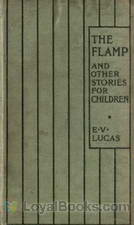 The Flamp, The Ameliorator, and The Schoolboy's Apprentice
The Flamp, The Ameliorator, and The Schoolboy's Apprentice
| |
By: Edwin Herbert Gomes (1862-) | |
|---|---|
 Children of Borneo
Children of Borneo
| |
By: Edwin Pearson | |
|---|---|
 Banbury Chap Books And Nursery Toy Book Literature
Banbury Chap Books And Nursery Toy Book Literature
| |
By: Effie Power (1873-1969) | |
|---|---|
 Lists of Stories and Programs for Story Hours
Lists of Stories and Programs for Story Hours
| |
By: Elbridge Streeter Brooks (1846-1902) | |
|---|---|
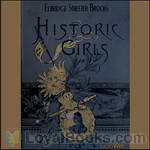 Historic Girls
Historic Girls
Twelve short stories of real girls who have influenced the history of their times. | |
By: Eleanor Gates (1875-1951) | |
|---|---|
 The Poor Little Rich Girl
The Poor Little Rich Girl
The Poor Little Rich Girl is a children’s fantasy about a little girl named Gwendolyn who is lonely and longs for a friend. But she is isolated by rich parents who ignore her and left to the care of servants who are indifferent. Her nanny’s carelessness with some medicine plunges Gwendolyn into a bewildering world in which metaphors literally come to life. | |
By: Eleanor H. Porter (1868-1920) | |
|---|---|
 Just David
Just David
A delightful story supporting the notion of finding beauty in all aspects of life, Just David follows a young boy, who slowly transforms the lives of those around him, as he teaches them to embrace the smaller things in life. The classic presents an encouraging tale to look beyond the horizon and not allow the world to dictate one’s action. The story begins with the introduction of a charismatic ten-year old boy David, who together with his father lives in the serene and secluded mountains... | |
 Pollyanna Grows Up
Pollyanna Grows Up
Pollyanna, now cured of her crippling spinal injury, and able to walk again, goes to live in Boston with Mrs. Carew, a heart-broken woman searching for her lost nephew. Aunt Polly goes abroad with Pollyanna’s new Uncle, Dr. Chilton. While in Boston, Pollyanna meets new friends and has several interesting adventures… A startling change in Aunt Polly’s and Pollyanna’s circumstances require Pollyanna to come up with a workable solution. Pollyanna’s solution brings all her new friends from Boston and her old friends in Beldingsville together. Pollyanna also discovers she has to make a choice. Who will win her heart? | |
 The Tangled Threads
The Tangled Threads
| |
By: Eleanor Hallowell Abbott (1872-1958) | |
|---|---|
 Peace On Earth, Good-Will To Dogs
Peace On Earth, Good-Will To Dogs
“If you don’t like Christmas stories, don’t read this one!And if you don’t like dogs I don’t know just what to advise you to do!For I warn you perfectly frankly that I am distinctly pro-dog and distinctly pro-Christmas, and would like to bring to this little story whatever whiff of fir-balsam I can cajole from the make-believe forest in my typewriter, and every glitter of tinsel, smudge of toy candle, crackle of wrapping paper, that my particular brand of brain and ink can conjure up on... | |
By: Eleanor Putnam (1856-1886) | |
|---|---|
 Prince Vance The Story of a Prince with a Court in His Box
Prince Vance The Story of a Prince with a Court in His Box
| |
By: Eleanor Raper | |
|---|---|
 The Little Girl Lost A Tale for Little Girls
The Little Girl Lost A Tale for Little Girls
| |
By: Eliza Lee Cabot Follen (1787-1860) | |
|---|---|
 Hymns, Songs, and Fables, for Young People
Hymns, Songs, and Fables, for Young People
| |
 Who Spoke Next
Who Spoke Next
| |
 Two Festivals
Two Festivals
| |
 Conscience
Conscience
| |
 Little Songs
Little Songs
| |
By: Elizabeth Davis Leavitt | |
|---|---|
 The Grasshopper Stories
The Grasshopper Stories
| |
By: Elizabeth Madox Roberts (1881-1941) | |
|---|---|
 Under the Tree
Under the Tree
| |
By: Elizabeth Rhodes Jackson | |
|---|---|
 It's Your Fairy Tale, You Know
It's Your Fairy Tale, You Know
The book is about a typical boy named Wendell, who lives in Boston and likes fairy stories and baseball MUCH more than fractions. Any more than this would be a spoiler! - Summary by Nan Dodge | |
By: Elizabeth Roberts MacDonald (1864-1922) | |
|---|---|
 Our Little Canadian Cousin
Our Little Canadian Cousin
In " Our Little Canadian Cousin," the author's intention is to tell, in a general way and in one defined local setting, the story of Canadian home life in the late 19th century. To Canadians, home life means not merely sitting at a huge fire-place, or brewing and baking in a wide country kitchen, or dancing of an evening, or teaching, or sewing ; but it means the great outdoor life — sleighing, skating, snow-shoeing, hunting, canoeing, and, above all, " camping out " — the joys that belong to a vast, uncrowded country, where there is " room to play." | |
By: Ella Farman Pratt (1837-1907) | |
|---|---|
 Lill's Travels in Santa Claus Land And Other Stories
Lill's Travels in Santa Claus Land And Other Stories
| |
 Sugar Plums
Sugar Plums
“Sugar Plums” by Ella Farman Pratt is a wonderful, sometimes tragic, collection of children's poems that run the spectrum between bliss and misfortune of seemingly ordinary days to the flights of fancy of children, parents and creatures alike; in places like stately homes, humble nests, city streets, and farm fields, just to name a few. Their stories are a masterful blend of whimsy and mischief, beauty and bewilderment, simplicity and, sometimes, sorrow. The journey that this collection takes its audience on is like no other - Summary by DOLZ | |
By: Ella Fraser Weller | |
|---|---|
 Nestlings A Collection of Poems
Nestlings A Collection of Poems
| |
By: Elsie Spicer Eells | |
|---|---|
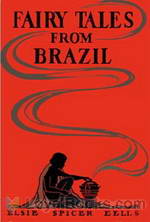 Fairy Tales from Brazil
Fairy Tales from Brazil
This book, subtitled "How and Why Tales from Brazilian Folk-Lore", is a collection of short stories, most of them etiologial myths from Brazilian Indian Folklore. | |
By: Elva S. Smith | |
|---|---|
 Christmas in Legend and Story A Book for Boys and Girls
Christmas in Legend and Story A Book for Boys and Girls
| |
By: Emerson Hough (1857-1923) | |
|---|---|
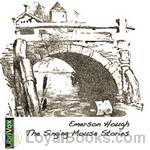 The Singing Mouse Stories
The Singing Mouse Stories
The singing mouse tells tales of nature in songs. This book is for those who want to know how the mountains ate up the plains, what the waters said or where the city went. | |
By: Emily Mayer Higgins | |
|---|---|
 Holidays at the Grange or A Week's Delight Games and Stories for Parlor and Fireside
Holidays at the Grange or A Week's Delight Games and Stories for Parlor and Fireside
| |
By: Ernest Thompson Seton | |
|---|---|
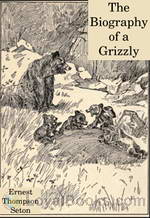 The Biography of a Grizzly
The Biography of a Grizzly
I first read this little book when I was in the fifth grade, and now more than fifty years later, I still find it fascinating. Ernest Thompson Seton was a man with a concern for nature her creatures and an excellent story teller. I could almost feel Wahb, the great grizzly’s pain and frustration as he tried to avoid contact with humans and just be left alone to carry out his bear business. Listening to this audio book will be an hour and a half well spent.Summary by Mike Vendetti, Narrator. | |
By: Estelle M. Hurll (1863-1924) | |
|---|---|
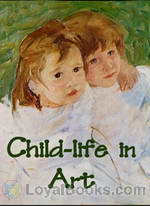 Child-life in Art
Child-life in Art
The poetry of childhood is full of attractiveness to the artist, and many and varied are the forms in which he interprets it. The Christ-child has been his highest ideal. All that human imagination could conceive of innocence and purity and divine loveliness has been shown forth in the delineation of the Babe of Bethlehem. The influence of such art has made itself felt upon all child pictures. It matters not whether the subject be a prince or a street-waif; the true artist sees in him something which is lovable and winning, and transfers it to his canvas for our lasting pleasure. | |
By: Esther Bakewell | |
|---|---|
 The Book of One Syllable
The Book of One Syllable
| |
By: Ethel C. Pedley (1859-1898) | |
|---|---|
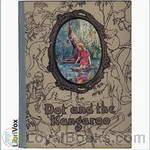 Dot and the Kangaroo
Dot and the Kangaroo
Dot and the Kangaroo, written in 1899, is a children’s book by Ethel C. Pedley about a little girl named Dot who gets lost in the Australian outback and is eventually befriended by a kangaroo and several other marsupials. | |
By: Ethel Cook Eliot (1890-1972) | |
|---|---|
 Little House in the Fairy Wood
Little House in the Fairy Wood
A lonely boy is taken in by the friendly inhabitants of a little house in the woods. Through this adventure, he finds the fairy folk, nature, and happiness. | |
By: Ethel Dow | |
|---|---|
 Diary of a Birthday Doll
Diary of a Birthday Doll
A doll, given to a young girl for her birthday, goes through adventures and faults to get her new mother to love her. - Summary by Emma Hatton | |
By: Ethel Sybil Turner | |
|---|---|
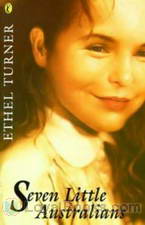 Seven Little Australians
Seven Little Australians
This is the story of seven incorrigible children living near Sydney in the 1880’s with their military-man father, and a stepmother who is scarcely older than the oldest child of the family. A favourite amongst generations of children for over a century, this story tells of the cheeky exploits of Meg, Pip, Judy, Bunty, Nell, Baby, and The General (who is the real baby of the family), as well as providing a fascinating insight into Australian family life in a bygone era. | |
By: Ethel Twycross Foster (1881-1963) | |
|---|---|
 Little Tales of the Desert
Little Tales of the Desert
A six year-old girl named Mary spends Christmas vacation with her parents in the Arizona desert of 1901 or thereabouts. | |
By: Etta Austin Blaisdell McDonald (1872-) | |
|---|---|
 Rafael in Italy A Geographical Reader
Rafael in Italy A Geographical Reader
| |
By: Eugene Field (1850-1895) | |
|---|---|
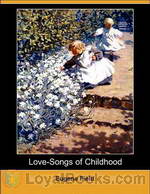 Love-Songs of Childhood
Love-Songs of Childhood
If you've heard and loved that delightful nursery rhyme/lullaby, Wynken Blynken and Nod you'd certainly enjoy browsing through its creator Eugene Field's Love Songs of Childhood. The volume contains some forty or more poems for children, which are ideal for read aloud sessions with young folks. Parents will certainly enjoy reading them too. Most of these poems have been set to music and are ideal for family sing-alongs too. Eugene Field was a gifted humorist as well as being a talented children's writer... | |
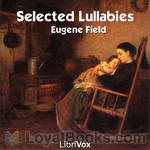 Selected Lullabies
Selected Lullabies
The sweetest songs the world has ever heard are the lullabies that have been crooned above its cradles. The music of Beethoven and Mozart, of Mendelssohn and Schumann may perish, but so long as mothers sing their babies to sleep the melody of cradle lullabies will remain. Of all English and American writers the one who sang most often and most exquisitely these cradle songs was Eugene Field, the children’s poet. His verses not only have charm as poetry, but a distinct song quality and a naive fancy that is both childlike and appealing... | |
 With Trumpet and Drum
With Trumpet and Drum
The book is made up of poems compiled from the “Little Book of Western Verse,” the “Second Book of Verse,” and the files of the “Chicago Daily News,” the “Youth’s Companion,” and the “Ladies’ Home Journal” , including such favorites as The Sugar Plum Tree, Wynken, Blynken, and Nod, and Little Boy Blue, by the Poet of Childhood, Eugene Field. - Summary by AnnaLisa Bodtker | |
By: Eulalie Osgood Grover (1873-) | |
|---|---|
 Mother Goose The Original Volland Edition
Mother Goose The Original Volland Edition
| |
 Kittens and Cats: A Book of Tales
Kittens and Cats: A Book of Tales
This book consists of fifty-two very short fictitious stories about cats and kittens, which have been written for children. Many of the stories have been written by cats and address the queen, many of them are commentaries on well known nursery rhymes, and many of them are both. | |
By: Eva K. Betz (1897-1968) | |
|---|---|
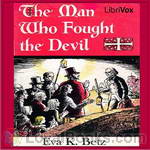 The Man Who Fought the Devil
The Man Who Fought the Devil
Jean Marie Vianney always found it hard to learn. In fact, he made history by receiving a zero as his examination mark after his first year of study in the seminary. But with determination, and with God’s help, he won through. He became a hard-working parish priest and then a pastor – the beloved Cure of Ars.Week by week, year by year, his fame as an advisor and a confessor grew. People flocked from great distances to his little church, and privately, among themselves, they called him “saint”... | |
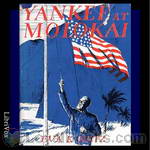 Yankee at Molokai
Yankee at Molokai
As a daring soldier in the Union Army, Ira Dutton earned the respect and affection of the men around him. Handsome and affable, he could have had a full social life when the war was over. But he felt that his "wild years" demanded atonement - and where could that better be found than in Molokai, where the ailing Father Damien needed help?So he made a free gift of himself, his strength and his capacity for love. Deeply patriotic, he cultivated in his charges devotion to America. A vivid exciting story. | |
By: Eva Lecomte | |
|---|---|
 Paula the Waldensian
Paula the Waldensian
Into the home of an interesting but self-centered family in old France comes Paula, a young orphaned cousin, from the little village of Villar, in the Waldensian Valley. Though living very simply, tending cows, goats, sheep and rabbits, Paula has been brought up to know and love the Lord Jesus and read the Scriptures. Her Lord and His Word are the center of her life, and she can no more keep this good news all to herself than she can stop breathing or eating. This causes a good many complications, for her cousins' home was one where "religion" was a forbidden subject, never to be mentioned, and Paula soon found herself forbidden to read her own precious Bible... | |
By: Eva March Tappan (1854-1930) | |
|---|---|
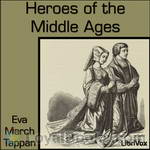 Heroes of the Middle Ages
Heroes of the Middle Ages
“The object of this book is to bring together stories of the most important movements in the history of Europe during the Middle Ages, and to make familiar the names of the most important figures in those scenes. I have endeavoured to weave a tapestry in which, with due colour, may be traced the history of the rise and fall of the various nationalities and the circumstances and mode of life of each—in short, to give the young reader an approximation to the background for the study of his country’s history which a wide reading gives to a man.” | |
 Makers of Many Things
Makers of Many Things
How are friction matches made? How do rags and trees become paper? Who makes the dishes on our tables? Published in 1916, this children's book explains the origins of everyday items in an entertaining and informative way. There are plenty of illustrations, so please feel free to read along. | |
By: Evelyn Snead Barnett | |
|---|---|
 Jerry's Reward
Jerry's Reward
| |
By: F. Scott Fitzgerald (1896-1940) | |
|---|---|
 This Side of Paradise
This Side of Paradise
A romantic and witty novel that has weathered time to remain one of America’s classic pieces. In the shadows of the great Gatsby is another brilliant novel by F. Scott Fitzgerald. This book is evidence to Fitzgerald’s literal genius because it was written by the author in his twenties to mirror his experiences at the time. It paints a picture of what it was like to be a young man or woman in the 20th century and in the wake of the First World War. The book is set on a foundation of socialist principles... | |
By: Fannie E. (Fannie Ellsworth) Newberry (1848-1942) | |
|---|---|
 Joyce's Investments A Story for Girls
Joyce's Investments A Story for Girls
| |
By: Fannie Hardy Eckstorm (1865-1946) | |
|---|---|
 The Woodpeckers
The Woodpeckers
The Woodpeckers is a wonderful introduction to the world of bird study for the young naturalist, covering such topics as how he finds food, courting, how he builds his nest, the interesting ways he uses his different body parts as tools, among other topics discussed in the book. If you wish to investigate further, the book has a few diagrams and an Appendix that contains more technical information such as detailed descriptions of the different species of North American woodpeckers which were not read as part of this audiobook. | |
By: Fanny Coe [editor] (1866-1956) | |
|---|---|
![The Book of Stories for the Storyteller by Fanny Coe [editor]](/image/layout2/The-Book-of-Stories-for-the-Storyteller.jpg) The Book of Stories for the Storyteller
The Book of Stories for the Storyteller
This is a delightful collection of 43 fairy tales (both old and new), folk lore, myths and real life stories by a variety of authors, brought together by writer Fanny E Coe. They are mostly short and are fun to listen to by children and adults and most teach valuable lessons about life. Some of the stories are: A Legend of the North Wind; How the Robin's Breast became Red; The Little Rabbits; St Christopher; The Necklace of Truth; A Night with Santa Claus; The Wolf-Mother of Saint Ailbe; Pocahontas and How Molly spent her Sixpence | |
By: Fanny Fern (1811-1872) | |
|---|---|
 Little Ferns For Fanny's Little Friends
Little Ferns For Fanny's Little Friends
| |
By: Fanny Fire-Fly | |
|---|---|
 The Ducks and Frogs, A Tale of the Bogs.
The Ducks and Frogs, A Tale of the Bogs.
| |
By: Father John Koenig (1916-2004) | |
|---|---|
 Stories for God's Little Ones
Stories for God's Little Ones
A charming collection of nine short stories for children with a moral weaved in each. These were originally published as separate booklets, under the series title "Stories for God's Little Ones". | |
By: Félicité Lefèvre (1869-) | |
|---|---|
 The Cock, The Mouse and the Little Red Hen an old tale retold
The Cock, The Mouse and the Little Red Hen an old tale retold
| |
By: Felix Leigh | |
|---|---|
 London Town
London Town
| |
By: Ferdinand Schmidt (1816-1890) | |
|---|---|
 Gudrun
Gudrun
The charming story of “Gudrun” is a romance of the old heroic period, written by some unknown poet of Austria or Bavaria in the thirteenth century. Next to the "Nibelungen Lied," it is the most important of the German epic poems...The same elemental passions are depicted. The men are brave, vigorous heroes, rejoicing in battle and feats of prowess; the women are beautiful, constant, and courageous. There are many fine delineations of character in the original, as well as vigorous sketches of northern scenery... | |
By: Florence Alice Sitwell (1858-1930) | |
|---|---|
 Daybreak A Story for Girls
Daybreak A Story for Girls
| |